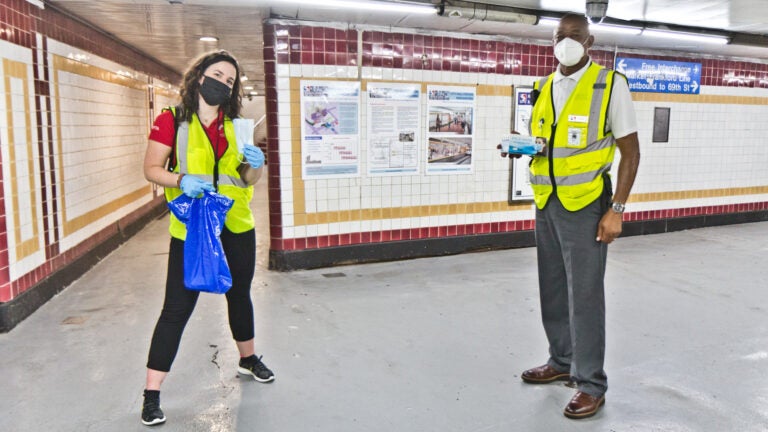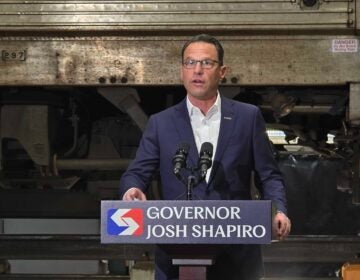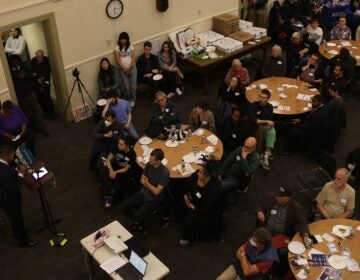SEPTA keeps no-enforcement mask policy as other transit agencies begin fines
SEPTA officials say they will not put frontline employees in a position to enforce the agency’s mask requirement.

Jessica Mangold (left) and Leon Vaughn (right) are SEPTA social distancing coaches who hand out masks and encourage riders to stay safe during the pandemic. (Kimberly Paynter/WHYY)
Ask us about COVID-19: What questions do you have about the current surge?
Even as peer transit agencies in New York and New Jersey step up their enforcement of mask-wearing, SEPTA maintains that it won’t start issuing fines or citations to people who don’t wear face coverings on buses, trains and trolleys.
On Amtrak, you can get kicked off your train if you won’t cover your face. Mandated by New York Gov. Andrew Cuomo, the MTA began issuing $50 fines in September to riders who refused to wear a mask. The Port Authority adopted the same policy earlier this month.
To date, the MTA has issued 10 of these fines, and the Port Authority has issued five, officials said at an MTA press conference.
That level of enforcement is not on the table for SEPTA, even as the city moves into a stricter lockdown because of an exponential spike in coronavirus cases. The average number of new cases reported per day last week was higher than the number of reported cases during the city’s worst week in April, Mayor Jim Kenney said Monday during a press conference announcing new restrictions on businesses and gatherings both indoor and outdoor.
“SEPTA will not have police enforcement, and we will not put frontline employees in a position where they have to enforce the policy by banning riders or issuing citations,” said SEPTA spokesperson Andrew Busch. “Employees will continue to remind customers about the mask requirement, and direct customers to available resources if they need a mask.”
Philly’s public transit network has been wary of enforcing the system’s mask requirement since April when a bus driver asked a passenger to put on a face covering, and the interaction ended in Philadelphia police forcibly removing the man from the bus.
“From our experience, we think SEPTA is going to see better results by engaging customers and asking them to help and do their part,” Busch said. “The continued increases in SEPTA’s compliance rates backs that up.”
Mask compliance is especially important now — both on public transit and citywide, as Philly’s positivity rate continues to soar above other major cities.
Busch said that despite the lack of enforcement, SEPTA riders continue to comply with the system’s mask mandate. Over the summer, the Philly transit agency counted 81% of people wearing masks correctly across the network. This fall, that rate jumped to 90%, Busch said. Another 5% of riders are wearing masks — just not correctly, over their mouth and nose.
Overall SEPTA ridership levels remain anemic eight months into the pandemic and one day into a new phase of restrictions designed to keep more people at home. The overall transit system sees 30% of its pre-COVID levels, and Regional Rail dips even lower at 12%, said SEPTA spokesperson John Golden.
Meet Mask Force Philly
SEPTA officials announced on Tuesday that the Philly transit authority has joined a regional “Mask Force,” made up of New York and New Jersey public transportation agencies that want to refresh their commitment to mask-wearing on board.
It’s basically just a public awareness campaign, with very few concrete changes for SEPTA.
“For the most part, we joined as a way to try to amplify the message that we’ve been stressing about the importance of wearing face masks,” Busch said.
The local branch of the partnership is called SEPTA Mask Force Philly, per General Manager Leslie Richards. She joined the public announcement, hosted in the World Trade Center Oculus, by video to outline SEPTA’s coronavirus commitments for 2021: Educating riders on the importance of mask-wearing and giving out free masks to those who show up to board without one.
If those goals sound familiar, it’s because they are. They’re essentially the same as those set out by SEPTA’s social distancing coaches program, piloted over the summer and then extended until Wednesday.
“Wearing a mask or facial covering in public, and specifically on public transit, is quite simply the best thing anyone can do,” Richards said. “It’s the most powerful weapon we have against the virus.”
Before SEPTA joined the Mask Force effort, its public-facing coronavirus arm was called the social distancing program. It deployed employee volunteers at transit hubs like subway and Regional Rail stations to hand out masks to riders.
This summer, 120 volunteers distributed more than 1,000 masks to riders, per SEPTA spokesperson John Golden. But the volunteers — and SEPTA police — could not enforce mask-wearing, or kick people out who weren’t wearing them.
“We’re out there not to correct the way people are acting,” Jessica Mangold, SEPTA’s statistical reporting project manager who volunteered as a coach, told PlanPhilly in August. “We don’t want anyone getting into any kind of confrontation. We’re just out there to provide support if needed.”
Mask Force Philly will eclipse the social distancing coaches program — but SEPTA is still developing the specifics, Busch said.

Subscribe to PlanPhilly
WHYY is your source for fact-based, in-depth journalism and information. As a nonprofit organization, we rely on financial support from readers like you. Please give today.






![CoronavirusPandemic_1024x512[1]](https://whyy.org/wp-content/uploads/2020/03/CoronavirusPandemic_1024x5121-300x150.jpg)


